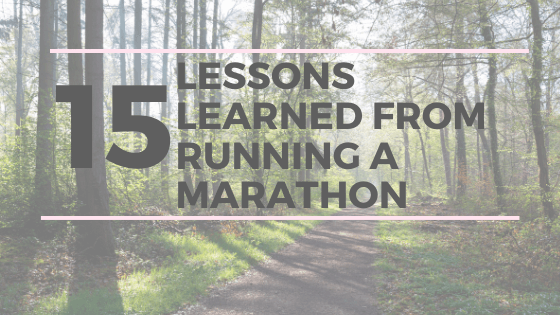 I completed a marathon over the last 12 months and I decided to write this blog so that you will get an understanding of the preparation required around nutrition and training when you don’t have a lot of time and life is a juggle. Here are my top 15 lessons learned that may be helpful if you are currently in the ‘thinking about’ stage of running a marathon…
I completed a marathon over the last 12 months and I decided to write this blog so that you will get an understanding of the preparation required around nutrition and training when you don’t have a lot of time and life is a juggle. Here are my top 15 lessons learned that may be helpful if you are currently in the ‘thinking about’ stage of running a marathon…
- It might seem fairly obvious but setting the goal is a critical step, then work back from that with your training and nutrition plan. It took me some time to figure out my goal race, but I did have an autumn marathon at the back of my mind. Once I had it booked, that’s when the mindset shifts into get out and just doing it.
- For a first-timer assessing how you fuel this training and understanding what and how much you eat is super important. If you leave these thoughts too late, you may fall foul of the latest and greatest ‘trends’ with all sorts of supplements and neglect the essentials that are individual and activity dependent.
- You won’t be going far if you don’t have the right gear and luckily for runners, we are a bit like Cinderella, the shoe must fit! A decent pair of runners is the main priority and invest early.
- For the time-poor marathon runner, running has to be a priority. Saying yes to running means saying no to something else. Thoughts that you might fit in any other sports, especially
 towards the end of the training cycle can be difficult. I found that I could plan the more extended weekend runs well, but the increased volume during the week was challenging. Pilates and post-run exercises were what I focused on outside training, but this is an area for improvement, and I could have done better.
towards the end of the training cycle can be difficult. I found that I could plan the more extended weekend runs well, but the increased volume during the week was challenging. Pilates and post-run exercises were what I focused on outside training, but this is an area for improvement, and I could have done better. - Joining a club or running with friends, especially for intervals or hill sessions, can help your training progress and you move beyond your comfort zone.
- Don’t take your family and supporters for granted. The meal in the oven when you get back from the long runs are golden moments.
- When planning your taper week, it should also include work, family and sleep, not just training and nutrition! I could have done much better about managing that time around family and work. I should have felt rested, but I was wound up and tired.
- As a sports nutritionist, I focused on keeping my available energy optimum ie energy you take in as food versus the energy that goes out from training. This ensures bone health and
 hormonal systems are not sacrificed for energy to train. Focusing on my hunger(it normal to feel hungry a lot!) and fullness were good indicators and book ending each session with nourishing foods, increasing complex carbs, healthy fats and proteins around my training. I did stay healthy and uninjured throughout training. I also focused on minimizing the chance of colds before the event by increasing my colorful fruit and veg intakes, taking a vitamin C and zinc supplement(In a Cochrane review(robust review) showed no benefit of initiating vitamin C supplementation (>200 mg/day) when you have the cold but ≥200 mg/day vitamin C supplementation reduces common cold incidence by about half for athletes if you take it during the strenuous periods, stayed mindful of hydration and hand hygiene especially as I was going to be travelling by plane.
hormonal systems are not sacrificed for energy to train. Focusing on my hunger(it normal to feel hungry a lot!) and fullness were good indicators and book ending each session with nourishing foods, increasing complex carbs, healthy fats and proteins around my training. I did stay healthy and uninjured throughout training. I also focused on minimizing the chance of colds before the event by increasing my colorful fruit and veg intakes, taking a vitamin C and zinc supplement(In a Cochrane review(robust review) showed no benefit of initiating vitamin C supplementation (>200 mg/day) when you have the cold but ≥200 mg/day vitamin C supplementation reduces common cold incidence by about half for athletes if you take it during the strenuous periods, stayed mindful of hydration and hand hygiene especially as I was going to be travelling by plane. - It is natural to be nervous before a race, but don’t underestimate those nerves, especially if you are someone that suffers from exercise-induced gastrointestinal issues. Have some coping mechanism that helps you deal with and process your stress. The morning of the event, we had a train journey out to the start line. I am convinced that the mediation on my phone ensured that when I reached the start line, I hadn’t a nerve left in my body and was ready to go.
- Writing down and logging my workouts was satisfying and motivating. A running journal, a coach or some way of recording your workouts can be the highlight of your training on the less motivated days.
- Back to nutrition! Practice race day nutrition early. Test constantly during your long runs and if you are new to the nutrition piece, then at least 10-13 sessions before an event is the minimum to get nutrition plan pinned down.
- Factor in a prep race that challenges you and that is close enough to your competition. If at all possible, aim for a race that may have similar environmental conditions that you may
 encounter on race day. That’s the hard part. This test race can give you huge indicators on managing pace, logistics of electrolytes, hydration and nutrition for your final marathon. I learned a lot about my electrolyte needs especially sodium requirements at the 30 km race that I ran at 21C. Those insights focused the actions I needed to take. Don’t ignore the learnings from these races.
encounter on race day. That’s the hard part. This test race can give you huge indicators on managing pace, logistics of electrolytes, hydration and nutrition for your final marathon. I learned a lot about my electrolyte needs especially sodium requirements at the 30 km race that I ran at 21C. Those insights focused the actions I needed to take. Don’t ignore the learnings from these races. - I ‘m a girl who likes caffeine, so I did apply some of my caffeine knowledge! Caffeine can allow an athlete to accumulate more significant training stress, via the reduced perception of exertion. I used caffeine gums which were a nice change to sweet foods, and the brand I used had a subtle peppermint flavour. I didn’t minimize my habitual caffeine intake and still found benefit, N=1 experiment! I’m not sure if it benefited my time but definitely made those last hard miles feel a little easier. Your response may be different.
- I didn’t realize the importance of that need to reward yourself after completion of the marathon. I returned into a week of work and crashed by the Friday in both mind and body. I was exhausted. Have a reward of time off as part of your recovery.
- Many people asked why did I want to run a marathon now? Knowing why you want to achieve your goal keeps you motivated, and let it be an important one. For me, I just enjoy running, I had ran ½ marathons and it was more why not now and I felt I could do it.


 Whatever event/goal you choose for the year ahead make it one that takes you a tiny bit out of your comfort zone and then you will have YOUR stand out marathon in the bag.
Whatever event/goal you choose for the year ahead make it one that takes you a tiny bit out of your comfort zone and then you will have YOUR stand out marathon in the bag.


